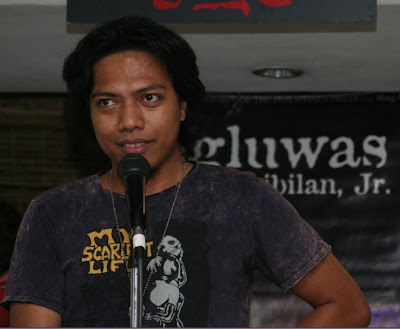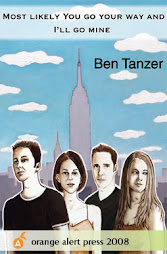 Zosimo Quibilan, Jr.
Zosimo Quibilan, Jr.The term culture can cover so many different ideas and principles, topics and creations, thoughts and theories. I had thought that I had been talking about culture over the last year and a half, and maybe I had, but today I feel we are about to touch on a whole new level of culture. Perhaps it is because we are about to discuss two very different cultures, or maybe it is may fascination and honest ignorance about cultures other then my own, but I am extremely honored to presented the following interview. I love the story that Zosimo has tell and I am greatful that he opened up and allowed his thoughts to flow.
Filipino writer Zosimo Quibilan, Jr. currently lives in Los Angeles, but he is originally from the Philippines. His debut novel, Pagluwas, was written in his native language, and he just complete the first translation. In fact most of his writing is done in his native language, and then translated. As we will find out, this can change elements of a story making both texts all the more interesting. A National Award winner in the Philippines, Zosimo continues to study and elevate his personal culture and his native country's culture, all while learning the new culture in L.A.
It is my pleasure to present the thoughts of Zosimo Quibilan, Jr.
Orange Alert (OA): Your debut novel, Pagluwas, was published in 2006 on UP Press, and won a national book award. What was that experience like? Do you still look back at that work with fondness?
Zosimo Quibilan (ZQ): Pagluwas is still fresh to me as when I first came up with the idea. It began as a writing exercise - to write really short stories about random objects. After I had come up with around 20 stories, the idea of making them inter-connected followed. When I submitted the manuscript, I left it to the Press to classify the book. As expected, they saw it as a collection of short stories. Later, it won in that category at the 2006 Philippine National Book Awards.
I wanted Pagluwas to accomplish so many things. For one, I wanted to challenge conventional notions in Philippine fiction like, say, the prescribed length. I didn't write flash fiction because that was the trend but it was my response to the 21st century reality of having less and less time to read. And because the Philippines does not have a reading tradition/culture (more on this later), I thought writing shorts might just spark anew an interest in the written word.
I also used colloquial Filipino in the book to see if such language would be acceptable in the academe/literary scene. In the Philippines, the chances of getting published usually depend on the type of language one uses. Although no one would dare admit, there is an unwritten rule that the language of Philippine literature must be in either formal Filipino, or English. In fact, most of the magazines in the Philippines that publish poems and short stories are English-language magazines. Meanwhile, colloquial Filipino is usually considered the language used by the masses. It's also the language used in what is considered "low culture" – slapstick comedy shows, noontime variety shows, tabloid sheets - in short, it is used practically everywhere but never in literature.
Since I wrote in the language that's not alienating to ordinary people, (I wanted to do as Raymond Carver did, to write in the language that people actually use), I thought there was little chance for my manuscript to even get reviewed. Luckily, I got published.
I wanted to go out and promote this alternative view of literature written in Filipino but two days after I launched the book, my family moved to the U.S. I didn't even have the chance to bask, so to speak, in the light of being a "published writer."
The book, however, was well-received by critics so I guess that's good enough. The National Book Award was an even greater affirmation although I wasn't really able to relish the success. I was already here when I won. Also, despite the award, I still wonder whether I was able to influence a new way of looking at Philippine literature. There's still a lot of work to be done. That's why Pagluwas will always remain fresh to me. It will forever remind me of my dream to usher in change in Filipino-language fiction, at least.
OA: What percentage of your work is written in your native language? Do you feel that emotion or intention or anything can be lost or confused when your text is translated to English?
ZQ: Ninety percent of my work is written in Filipino. And while translating it into English can be easy for me to a certain extent because I was – like most Filipinos are -- raised bilingual, many things are indeed lost in translation. Cadence, for example, is a challenge to preserve in translation. Since cadence affects the general emotion of a story, I guess you can say some emotion is lost. My wife, who helps me translate my work, notes that the rhythm of my prose is usually lost in translation.
It is also difficult to translate some idiomatic expressions or distinct Filipino cultural subtleties but that's a common problem. In these cases, there is always a struggle between translating literally and resorting to adaptation.
OA: I've seen you make comments about the way literature is perceived or accepted in the Philippines. Is there the same market or demand or appreciation for literature there as there is in the states?
ZQ: Discussing literature in a third world country like the Philippines must always be grounded in economics. Don't get me wrong, but there is an abundance of talented Filipino writers. In fact, Penguin Classics is set to release Filipino American poet Jose Garcia Villa's collected poems in August. The challenge lies in making the works of literature reach the people when there are only a few major presses that publish creative writing (poetry, short stories, etc.). Getting published is not an assurance that one will have readers. People would rather spend their hard-earned money on necessities like food or rent than books or magazines.
Last Friday, I listened to Filipino American writer Ninotchka Rosca, who won an American National Book Award for her novel Twice Blessed, talk at a local bookshop. She was celebrating the 20th anniversary of State of War, her first book, which was published here in the States. At one point in her speech, Rosca expressed her shock after learning from a certain fact book that only three percent of Filipinos read (that is, literature as in books, newspapers, magazines, etc.; Filipinos are highly literate). She added that the natives, our ancestors, had a rich oral tradition before the Spanish and American colonizers came.
The Filipinos' perception towards literature continues to be deeply influenced by how it was presented to us by the colonial powers. Written literature was introduced in the Philippines in the form of a prayer book called Doctrina Christiana,published in 1593. It was the first book published in the Philippines, yes, but then it placed literature on a pedestal (i.e. the altar). Consequently, written literature became the only form of recognized/legitimate literature and instead of being an essential part of culture, it has become more of a luxury.
In the midst of all these, the literature market in the Philippines, ironically, has practically no place for a writer in Filipino. Among the few publications still out there, most only publish poetry and fiction in English. There are perhaps only two that accept for publication poetry in Filipino. There is one that accepts fiction in Filipino but its circulation is a bit erratic. For a fiction writer like me to get better chances at being published, I must either translate my work to English or wait for calls for submissions to an anthology.
OA: Having your book published back in 2006 and also having pieces in on-line journals and posted on your blog, do you feel that printed work is more legitimate than on-line work? Do you write differently when you know a piece will appear in print?
ZQ: I can honestly say that I've gone past the idea that one media is more legit than the other. Of course, there will always be romanticized notions of having one's work on paper. So many writers have written about the satisfying experience of opening a book, smelling the infusion of aromas of paper and ink, or listening to the soothing sound of a turning page. There is nothing wrong in craving that.
However, one cannot afford to ignore the fact that more and more people are abandoning print in favor of online media. The LA Times recently announced that they were letting go of a few thousand jobs simply because their revenues had shifted drastically from print to online. Other large media companies too have already begun inching towards that 1990s dream of a paperless society. The recent Hollywood Writers' strike ensued because of a disagreement in online revenues.
However, I make clear distinctions when writing for these two media. There are certain differences in the way each product is consumed. For example, the non-linearity of online publications can be effectively utilized in a story. Instead of ordered chapters, one can make use of random hypertext jumps, or incorporate other media like music and video in one's work, whereas print publications may only contain text and images. Needless to say, I'm more excited by the possibilities of publishing online.
OA: You have written several book reviews. Do you find yourself looking at books differently as a reviewer than as a fellow writer? Has this affected the way you approach your personal writing?
ZQ: In my blog, my reviews (the longer ones, at least) are on books written by Asians. Reading more Asian literature has been an obsession of mine since moving here to the U.S. last year. I want to get a sense of not only the body of work that Asians contribute to world literature but also the type of literature that the West allows to get published here. That alone tells a lot about how the West sees and, more importantly, wants to regard Asia.
I guess, being a writer, I can't help but notice more than story when I read books. Most of the time, I just want to get absorbed in the story, suspend all disbelief and enjoy. Then I see the literary techniques (and tricks) employed and these sometimes ruin the story for me.
In the same manner, having seen the story in this perspective makes me appreciate the work more. I believe that writers have to achieve a certain expertise in crafting a narrative - how a story unfolds can be as exciting as what the story is about.
OA: What's next for Zosimo Quibilan Jr.?
ZQ: My wife and I are finishing the translation of Pagluwas so we can have it published here in the States.
I'm also finishing a longer narrative, a 'novel' called Ang Dakilang Nobelang Filipino (The Great Filipino Novel). It's part conculture, part parody and everything else Filipino except being the great Filipino novel. I'm quite excited about this work because I thought I broke more conventions in Filipino fiction than what I did, albeit subtly, in Pagluwas.
I also regularly update my literary blog, my Filipino-language fiction blog called Kuwento or Stories and my pet project music blog about 100 songs in my life's soundtrack. Of course, I only start working on these after I help my wife attend to our three wonderful kids.
Bonus Questions:
OA: What is the coolest bookstore in your area? What do you like going there?
ZQ: Brand Bookshop in Glendale. They offer the best selection (relatively cheaper) and most of the books there are in excellent condition. My wife and kids and I regularly go there because the place is pretty cozy and well-organized. To my 3-year-old daughter, this is The Bookstore, so when once I told her that we were going to the bookstore and went to Borders instead, she got disappointed.
We also always look forward to the semi-annual book sale in our local library (Eagle Rock, CA). It's simply too many good books for so much less.
OA: What type of music do you enjoy?
ZQ: In the 90's, (a past life, it almost seems) I used to front a punk rock band called Flowers for Zoe . We played mostly originals and enjoyed considerable success. Although, I'm more inclined to listen to rock, I think I'm more of an indie/alternative type of person. I currently listen to Midlake, Sufjan Stevens, Radiohead, Feist, Band of Horses, Cat Power, The Decemberists, Modest Mouse, Rilo Kiley, The Mountain Goats, Mark Kozelek, Owen, etc. From time to time, I turn the click-wheel of my iPod and listen to the classics - Pink Floyd, Led Zep, Hendrix, Mingus, Coltrane, Billie Holiday, Beethoven.
For more information on Zosimo Quibilan, Jr. please visit his blog, Kontra-Diction.
+by+Nick+Volkert).jpg)

















No comments:
Post a Comment